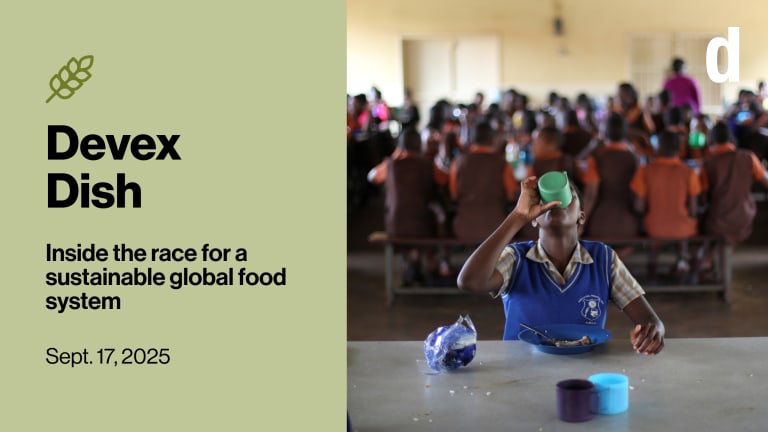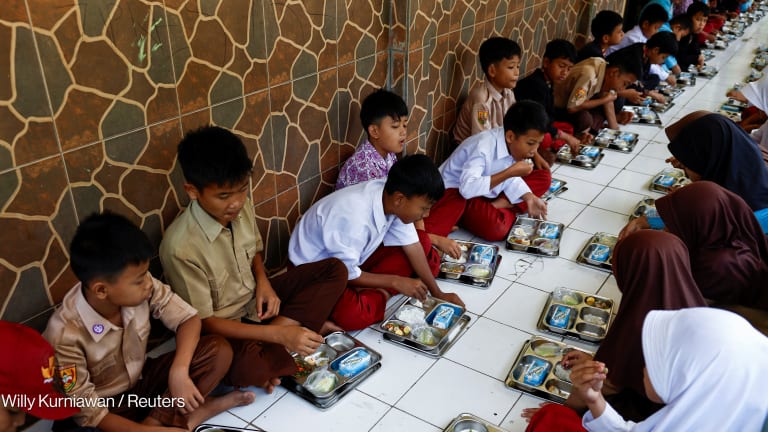
When we invest in children, we invest in a country’s human capital and long-term economic growth. Supporting access to education is essential to meet these ends, but school meals are also a way of investing in their health and nutrition, helping ensure that school children are ready to learn. However, while countries invest heavily in a child’s education — low- and middle- income countries invest $206 billion in education annually — health and nutrition investments for school-age children total approximately $4 billion, only 2% of education investments.
These impacts can be even greater for girls, especially for adolescent girls to stay in secondary school, and break out of a cycle of poverty by helping to prevent early marriage and pregnancy. One way that many governments, rich and poor alike, are doing that is through school meal programs. They see school meal programs as important investments that address multiple Sustainable Development Goals and are cherished by recipient children and their parents.
Single largest donor for school meals calls for better success metrics
The McGovern-Dole Food for Education Program under the U.S. Department of Agriculture is the single largest donor for school meals globally. But as the program faces increasing scrutiny back home, its director asks the sector to provide more evidence of success.
This is according to the “Global Survey of School Meal Programs" survey, and of the more than 125 countries that have responded so far, approximately 75% of those countries report that they had active school meal programs in the previous school year. From Bhutan to Brazil, Cape Verde, China, Honduras, Nepal, Nigeria, and beyond, large-scale school feeding programs are being established that receive 80% or more funding from government resources.
We have only just begun to analyze the responses, but so far the data only reaffirms the growing evidence — and survey results are still coming in.
Understanding trends
However, survey respondents say that it is hard to find and sustain adequate funding for the programs: implementation is challenging, staff often need more training, and they would like more rigorous impact studies to be done. But they also say that the programs have multiple and positive benefits for stakeholders throughout the value chain. I have been involved with school meal programs for 20 years, and the survey validates many of the trends we thought we were seeing in this regard.
Country after country is making a concerted effort to buy from their own farmers — including small-scale farmers. Trusted neighbors, and particularly women, are enlisted as cooks, often as volunteers, but increasingly trained and/or paid, in-kind or in cash, for their work. Several countries have found school meal programs as an avenue to employ youth, as well as women, in jobs ranging from producing and supplying fish, eggs, or meat, to performing packaging and quality control functions, monitoring food stocks, and more.
The programs bring parents and community members into the school, as well. They are most frequently seen as co-contributors — paying part or all of the cost of students’ meals, constructing needed facilities, and serving in management roles through parent-teacher associations or similar groups.
The survey also shows that more and more nutritionists are being deployed to ensure the quality of school menus, more cooks and students are receiving nutrition education, and more attention is being paid to preventing or mitigating obesity.
Reaching across the SDGs
School feeding is a natural partner for reaching large numbers of children with basic health, sanitation, and hygiene interventions, such as handwashing with soap before and after meals, deworming treatments, vision screening, and the provision of clean water. The survey indicates that it is not just true conceptually — these pairings are happening.
In fact, the evidence is mounting: these home-grown school feeding, or HGSF, programs address as many as seven SDGs — seven. In one program.
HGSF takes an integrated approach to end poverty (SDG 1) and hunger (SDG 2), to ensure good health and well-being (SDG3) to support equitable and quality education (SDG 4), which subsequently contributes to SDG 5 of supporting the empowerment of girls and women, provide clean water and sanitation (SDG 6), and finally, it helps forge partnerships for sustainable growth (SDG 17).
We can also add an eighth: school meal programs contribute to decent work and economic growth.
School meal programs work, and work in powerful ways, with specific, long-lasting, and intergenerational benefits to the individual families and children who participate, and with clear benefits as well for communities and countries where they are implemented.
We welcome any and all to rally around and invest in schools and school meal programs. In doing so, we — together — can help countries to achieve multiple SDGs, while we ourselves make good on SDG 17: Partnerships.








